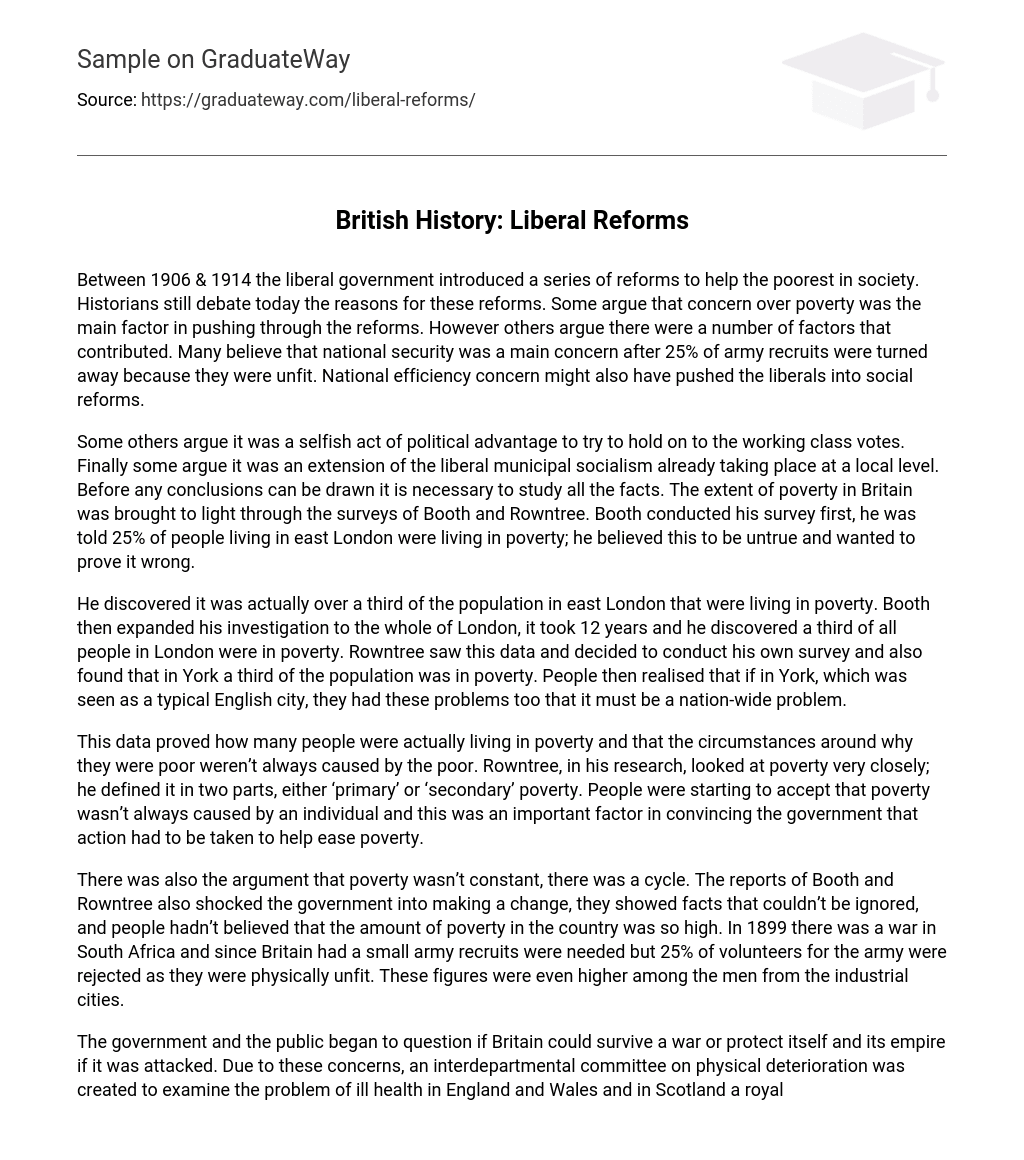Between 1906 & 1914 the liberal government introduced a series of reforms to help the poorest in society. Historians still debate today the reasons for these reforms. Some argue that concern over poverty was the main factor in pushing through the reforms. However others argue there were a number of factors that contributed. Many believe that national security was a main concern after 25% of army recruits were turned away because they were unfit. National efficiency concern might also have pushed the liberals into social reforms.
Some others argue it was a selfish act of political advantage to try to hold on to the working class votes. Finally some argue it was an extension of the liberal municipal socialism already taking place at a local level. Before any conclusions can be drawn it is necessary to study all the facts. The extent of poverty in Britain was brought to light through the surveys of Booth and Rowntree. Booth conducted his survey first, he was told 25% of people living in east London were living in poverty; he believed this to be untrue and wanted to prove it wrong.
He discovered it was actually over a third of the population in east London that were living in poverty. Booth then expanded his investigation to the whole of London, it took 12 years and he discovered a third of all people in London were in poverty. Rowntree saw this data and decided to conduct his own survey and also found that in York a third of the population was in poverty. People then realised that if in York, which was seen as a typical English city, they had these problems too that it must be a nation-wide problem.
This data proved how many people were actually living in poverty and that the circumstances around why they were poor weren’t always caused by the poor. Rowntree, in his research, looked at poverty very closely; he defined it in two parts, either ‘primary’ or ‘secondary’ poverty. People were starting to accept that poverty wasn’t always caused by an individual and this was an important factor in convincing the government that action had to be taken to help ease poverty.
There was also the argument that poverty wasn’t constant, there was a cycle. The reports of Booth and Rowntree also shocked the government into making a change, they showed facts that couldn’t be ignored, and people hadn’t believed that the amount of poverty in the country was so high. In 1899 there was a war in South Africa and since Britain had a small army recruits were needed but 25% of volunteers for the army were rejected as they were physically unfit. These figures were even higher among the men from the industrial cities.
The government and the public began to question if Britain could survive a war or protect itself and its empire if it was attacked. Due to these concerns, an interdepartmental committee on physical deterioration was created to examine the problem of ill health in England and Wales and in Scotland a royal commission was created. In 1904, their reports suggested many adult males’ physical condition was poor, they recommended an improved diet and less overcrowding. More specifically, free school meals and medical examinations for children.
These points were some of the first reforms the liberals introduced, so it is clear that a concern over national security had an effect on the reforms. British industry was facing great competition from the USA and Germany by the end of the 19th century, and it was no longer the strongest industrial nation. There was a great need for a healthier work force. People believed that if the health and educational of Britain’s worker force got worse, then the country’s position as an industrial power would be threatened.
Winston Churchill voiced his concerns about national efficiency; he said that part of the problem was that the unemployed didn’t know where the jobs were. Germany had started social reforms in the 1880s, if one of their main competitors had started to change, why could Britain not? More working class men had the vote since 1884 and the Liberals wanted to attract many of these votes. In 1900, the new Labour party promised social reforms, this was competition for the working class men’s votes, this would damage the Liberals chances of beating the Conservatives in future elections.
It was in the Liberal’s interests to lure voters away from voting for the Labour party by carrying out social reforms. New liberals argued that it was necessary for the government to intervene and get people out of social problems and that people had no control over these problems. Many people believe the reforms were introduced selfishly by the liberals to compete with the newly formed labour party; however the liberals were making changes before the formation of the labour party in 1900.
In conclusion, it is clear that concern over poverty was one of the main reasons for the reforms, but it was not the only one. The reports of booth and Rowntree proved that the situation was much more serious than it was first thought and the government had to intervene. This is clear because of the reforms and the acts passed to do with booth and Rowntree. However there were other factors did play a part in the reforms being introduced; poverty was one of the main reasons.





